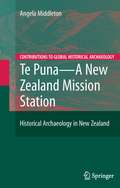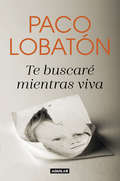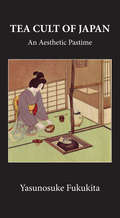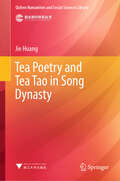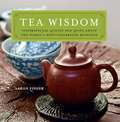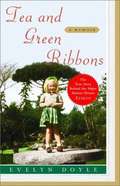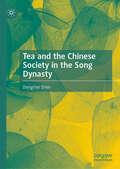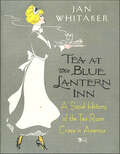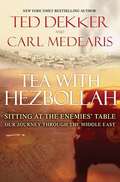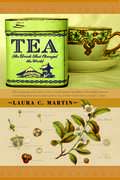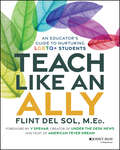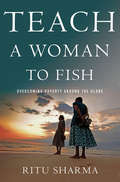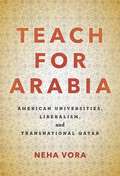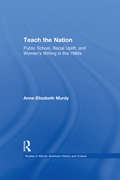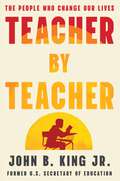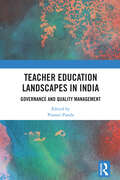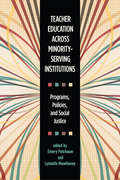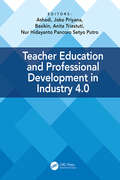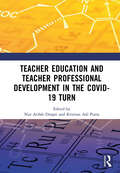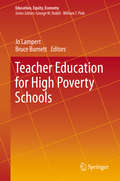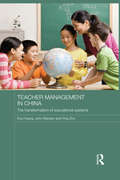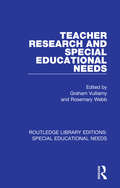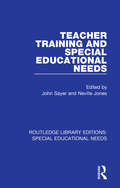- Table View
- List View
Taíno Indian Myth and Practice: The Arrival of the Stranger King (Florida Museum of Natural History: Ripley P. Bullen Series)
by William F. KeeganApplying the legend of the "stranger king" to Caonabo, the mythologized Taino chief of the Hispaniola settlement Columbus invaded in 1492, Keegan examines how myths come to resonate as history--created by the chaotic interactions of the individuals who lived the events of the past as well as those who write and read about them. The "stranger king" story told in many cultures is that of a foreigner who comes from across the water, marries the king's daughter, and deposes the king. In this story, Caonabo, the most important Taíno chief at the time of European conquest, claimed to be imbued with Taino divinity, while Columbus, determined to establish a settlement called La Navidad, described himself as the "Christbearer."Keegan's ambitious historical analysis--knitting evidence from Spanish colonial documents together with data gathered from the archaeological record--provides a new perspective on the encounters between the two men as they vied for control of the settlement, a survey of the early interactions of the Tainos and Spanish people, and a complex view of the interpretive role played by historians and archaeologists. Presenting a new theoretical framework based on chaos and complexity theories, this book argues for a more comprehensive philosophy of archaeology in which oral myths, primary source texts, and archaeological studies can work together to reconstruct a particularly rich view of the past.A volume in the Florida Museum of Natural History: Ripley P. Bullen Series
Te Puna - A New Zealand Mission Station
by Angela MiddletonEvangelical missionary societies have been associated with the processes of colonisation throughout the globe, from India to Africa and into the Pacific. In late 18th-century Britain, the Church Missionary Society for Africa and the East (CMS) began its missionary ventures, and in the first decade of the 19th-century, sent three of its members to New South Wales, Australia, and then on to New Zealand, an unknown, little-explored part of the world. Across the globe, a common material culture travelled with its evangelizing (and later colonizing) settlers, with artefacts appearing as cultural markers from Cape Town in South Africa, to Tasmania in Australia and the even more remote Bay of Islands in New Zealand. After missionization, colonization occurred. Additionally, common themes of interaction with indigenous peoples, household economy, the development of commerce, and social and gender relations also played out in these communities. This work is unique in that it provides the first archaeological examination of a New Zealand mission station, and as such, makes an important contribution to New Zealand historical archaeology and history. It also situates the case study in a global context, making a significant contribution to the international field of mission archaeology. It informs a wider audience about the processes of colonization and culture contact in New Zealand, along with the details of the material culture of the country's first European settlers, providing a point of comparison with other outposts of British colonization.
Te buscaré mientras viva
by Paco LobatónTras 25 años de Quién sabe dónde Paco Lobatón sigue dando voz a los desaparecidos. Te buscaré mientras viva es un libro y un homenaje. En él se encuentran catorce testimonios que componen, en realidad, una única historia, la de aquellos familiares que han sufrido la desaparición de un ser querido. El relato de casos como los de Cristina Bergua, Yéremi Vargas, David Guerrero o la malograda historia de Diana Quer, entre otros, es un reconocimiento a quienes, frente al vacío que genera toda desaparición, resisten bajo una misma premisa: «Mientras no existe la evidencia de muerte, existe esperanza de vida». De la mano de Paco Lobatón nos adentramos en hogares donde el tiempo se ha detenido, en familias arrasadas por la incertidumbre, la angustia del no saber y el pulso cotidiano con un sufrimiento que no termina. A través del testimonio de sus familiares, buscadores incansables, este libro nos transmite la voz de los desaparecidos. Juntas, estas voces encarnan una autobiografía colectiva y un poderoso llamamiento a la sociedad para que no se les ignore ni se les condene a la doble desaparición que supondría el olvido. Son voces que nos recuerdan nuestro deber de solidaridad como ciudadanos y el deber de las instituciones como responsables de la seguridad de todos. Este libro es una expresa invitación a que acompañemos a quienes sobreviven a la incertidumbre con un impulso imparable que se resume en cuatro palabras: «Te buscaré mientras viva». Los derechos de autor obtenidos de la venta de este libro se destinan a la Fundación Europea por las Personas Desaparecidas QSDglobal, para el cumplimiento de sus objetivos de ayuda a las familias.
Tea Cult Of Japan: An Aesthetic Pastime
by Yasunosuke FukukitaThe tea cult, commonly called the tea ceremony in English or cha-noyu in Japanese, is an aesthetic pastime that features the serving and drinking of powdered green tea.
Tea Poetry and Tea Tao in Song Dynasty (Qizhen Humanities and Social Sciences Library)
by Jie HuangThis book systematically explores the tea culture in the tea poetry of the Song Dynasty, comprehensively presents the style of tea Tao in the Song Dynasty, and presents the relationship between tea Tao and the creation of tea poetry in the Song Dynasty, greatly expanding the literary resources for the study of tea Tao and coming up with new findings, including the conclusion that tea art and tea Tao are one and the same, as the former constitutes the essence of the latter. Tea Tao is a crystallization of Chinese culture, which underwent broader and more profound development during the Song Dynasty. It has inherited the achievements of ancient Chinese thoughts and incorporated the new developments of Taoist and Zen Buddhist thoughts in the medieval period, showcasing the characteristics of the nation and the time. The cultivated personality of tea people is rooted in the vast land and traditional culture of China, which has defined the formation of tea Tao and the creation of tea poetry.
Tea Wisdom
by Aaron FisherSome of life's greatest pleasures can be found in the simple things, and there is nothing more basic, yet wonderful, than enjoying a steaming cup of tea on a damp, rainy day. Tea Wisdom is a wonderful collection of tea quotes, drawn from different centuries and parts of the world, celebrating the ability of tea to calm the nerves, enliven the mind and strengthen the spirit. Covering the full range of a tea lover's appreciation for this most celebrated of beverages, Tea Wisdom makes for a lovely treat.
Tea Wisdom
by Aaron FisherSome of life's greatest pleasures can be found in the simple things, and there is nothing more basic, yet wonderful, than enjoying a steaming cup of tea on a damp, rainy day. Tea Wisdom is a wonderful collection of tea quotes, drawn from different centuries and parts of the world, celebrating the ability of tea to calm the nerves, enliven the mind and strengthen the spirit. Covering the full range of a tea lover's appreciation for this most celebrated of beverages, Tea Wisdom makes for a lovely treat.
Tea and Green Ribbons: A Memoir
by Evelyn Doyle[From the dust jacket:] "In the slums of Dublin in 1953, Evelyn Doyle's mother ran off with a lover, abandoning her family and leaving Evelyn's father to care for six children. Already struggling to support his children as a painter and decorator, Desmond Doyle faced the fact that he would have to turn them over to church-run industrial schools while he went to England, where he could earn higher wages and save money to support them without state assistance. He believed the placement was temporary. However, upon his return to Dublin several months later, he discovered that the Irish state had assumed custody of the children and refused to release them. Tea and Green Ribbons is the astonishing, heart-wrenching tale of Desmond's dramatic quest to get his children back, told in gripping fashion by his daughter, Evelyn. In the ensuing years after losing his children, Desmond devoted himself to working with some of Ireland's foremost legal experts to fight both the Church and the government. Meanwhile Evelyn, his eldest child, discovered the crisp, clean joys and lonely sorrows of life in the care of nuns. After two years the Irish Supreme Court finally made an unprecedented decision--which, for the first time in Irish legal history, took into account the children's wishes--and Desmond, his daughter, and his sons began their lives again. Evelyn Doyle has crafted a jewel-like chronicle of a major turning point in Irish mores and culture. Uplifting, gritty, and emotionally compelling, this stunning memoir is an unforgettable celebration of the Irish spirit."
Tea and the Chinese Society in the Song Dynasty
by Dongmei ShenThis book, for the first time, comprehensively examines the relationship between tea and various aspects of social life in the Song Dynasty, pioneering a new field in the study of Song history. In the field of tea culture research, it is the first to clearly point out that the method of tea whisking was the dominant tea art form in Song society, elucidating the unique position of Song Dynasty tea culture in the history of Chinese culture. The book also proposes new insights based on historical materials regarding the close internal connection between the highly prosperous tea culture of the Song Dynasty and the systems of tribute tea and imperial tea bestowal, as well as the special origins of Japanese tea ceremony in relation to Song Dynasty tea culture.
Tea at the Blue Lantern Inn: A Social History of the Tea Room Craze in America
by Jan Whitaker“A delightful tour of the tearooms that dotted the nation in the first half of the twentieth century . . . [an] irresistible slice of American popular culture.” —BooklistThe Gypsy Tea Kettle. Polly’s Cheerio Tea Room. The Mad Hatter. The Blue Lantern Inn. These are just a few of the many tea rooms—most owned and operated by women—that popped up across America at the turn of the last century, and exploded into a full-blown craze by the 1920s. Colorful, cozy, festive, and inviting, these new-fangled eateries offered women a way to celebrate their independence and creativity. Sparked by the Suffragist movement, Prohibition, and the rise of the automobile, tea rooms forever changed the way America eats out, and laid the groundwork for the modern small restaurant and coffee bar.In this lively, well-researched book, Jan Whitaker brings us back to the exciting days when countless American women dreamed of opening their own tea room—and many did. From the Bohemian streets of New York’s Greenwich Village to the high-society tea rooms of Chicago’s poshest hotels, from the Colonial roadside tea houses of New England to the welcoming bungalows of California, the book traces the social, artistic, and culinary changes the tea room helped bring about.Anyone interested in women’s history, the early days of the automobile, the Bohemian lives of artists in Greenwich Village, and the history of food and drink will revel in this spirited, stylish, and intimate slice of America’s past.“The book is both informative and clear-eyed, and leavened with wonderful illustrations.” —House & Garden
Tea with Hezbollah: Sitting at the Enemies’ Table, Our Journey Through the Middle East
by Ted Dekker Carl MedearisIs it really possible to love one's enemies? That's the question that sparked a fascinating and, at times, terrifying journey into the heart of the Middle East during the summer of 2008. It was a trip that began in Egypt, passed beneath the steel and glass high rises of Saudi Arabia, then wound through the bullet- pocked alleyways of Beirut and dusty streets of Damascus, before ending at the cradle of the world's three major religions: Jerusalem. Tea with Hezbollah combines nail-biting narrative with the texture of rich historical background, as readers join novelist Ted Dekker and his co-author and Middle East expert, Carl Medearis, on a hair-raising journey. They are with them in every rocky cab ride, late-night border crossing, and back-room conversation as they sit down one-on-one with some of the most notorious leaders of the Arab world. These candid discussions with leaders of Hezbollah and Hamas, with muftis, sheikhs, and ayatollahs, with Osama bin Laden's brothers, reveal these men to be real people with emotions, fears, and hopes of their own. Along the way, Dekker and Medearis discover surprising answers and even more surprising questions that they could not have anticipated-questions that lead straight to the heart of Middle Eastern conflict. Through powerful narrative Tea With Hezbollah will draw the West into a completely fresh understanding of those we call our enemies and the teaching that dares us to love them. A must read for all who see the looming threat rising in the Middle East.
Tea: The Drink that Changed the World
by Laura C. MartinThis book is a fascinating history of tea and the spreading of tea throughout the world.Camellia sinensis, commonly known as tea, is grown in tea gardens and estates around the world. <P><P>A simple beverage, served either hot or iced, tea has fascinated and driven us, calmed and awoken us, for well over two thousand years.The most extensive and well presented tea history available, Tea: The Drink that Changed the World tells of the rich legends and history surrounding the spread of tea throughout Asia and the West, as well as its rise to the status of necessity in kitchens around the world. From the tea houses of China's Tang Dynasty (618-907), to fourteenth century tea ceremonies in Korea's Buddhist temples' to the tea plantations in Sri Lanka today, this book explores and illuminates tea and its intricate, compelling history.Topics in Tea: The Drink that Changed the World include: From Shrub to Cup: and Overview. History and Legend of tea. Tea in Ancient China and Korea. Tea in Ancient Japan. The Japanese Tea Ceremony. Tea in the Ming Dynasty. Tea Spreads Throughout the World. The British in India, China and Ceylon. Tea in England and the United States.
Teach Like an Ally: An Educator's Guide to Nurturing LGBTQ+ Students
by Flint Del SolAnswers to all your burning questions and practical advice for helping LGBTQ+ students thrive In Teach Like an Ally: An Educator's Guide to Nurturing LGBTQ+ Students, veteran classroom teacher and celebrated transgender advocate Flint Del Sol weaves humor, storytelling, and expertise into a hands-on guide for educator-allies. Del Sol offers actionable strategies that you can implement in classrooms right away. He also tackles the complex questions teachers face: What should you do when a student asks for one name in the classroom, but another at home? Or when you're sure a student is trans, but they haven't said anything to you? How do you know your bathroom pass policy isn't hurting your most vulnerable students? What do you do when your values are at odds with school policy? Building a positive school climate doesn't have to be intimidating. In Teach Like an Ally, you'll learn how educators can support each other and how we can all give LGBTQ+ students the best possible chance to flourish. Get candid answers to difficult questions about LGBTQ+ students in the classroom Become a stronger ally by understanding what LGBTQ+ students go through in secondary school settings Learn the research-backed practices you can implement to make your classroom a safe space for all Support all students in developing compassion and understanding for one another This pragmatic book is for teachers, administrators, families, and anyone committed to the wellbeing of LGBTQ+ students in secondary classrooms.
Teach a Woman to Fish
by Ritu SharmaAs the old axiom goes: "Give a man a fish and he eats for a day. Teach a man to fish and he eats for a lifetime." But teach a woman to fish, and everyone eats for a lifetime. In this firsthand account, Ritu Sharma shares how women can, and are, overcoming the forces that keep them in poverty. She chronicles her travels through four countries--Sri Lanka, Burkina Faso, Honduras, and Nicaragua--and the intimate interactions she had with the women living there. Sharma's story not only details her experiences, but also looks at the broader systems that prevent women from leaving poverty behind. From lack of property rights and government corruption to the scarcity of basic infrastructure like roads, these women are restricted by the external limitations placed upon them. Sharma draws from her experiences to frame a larger exploration of how Americans can be instrumental in helping women break free of restrictive systems and begin to facilitate women's upward mobility. Written in her engaging personal voice, Teach a Woman to Fish provides an insider's look at women in poverty, how Washington works, and how change really happens--from the United States to the rest of the world.
Teach for Arabia: American Universities, Liberalism, and Transnational Qatar
by Neha VoraTeach for Arabia offers an ethnographic account of the experiences of students, faculty, and administrators in Education City, Qatar. Education City, home to the branch campuses of six elite American universities, represents the Qatari government's multibillion dollar investment over the last two decades in growing a local knowledge-based economy. Though leaders have eagerly welcomed these institutions, not all citizens embrace the U.S. universities in their midst. Some critics see them as emblematic of a turn away from traditional values toward Westernization. Qatari students who attend these schools often feel stereotyped and segregated within their spaces. Neha Vora considers how American branch campuses influence notions of identity and citizenship among both citizen and non-citizen residents and contribute to national imaginings of the future and a transnational Qatar. Looking beyond the branch campus, she also confronts mythologies of liberal and illiberal peoples, places, and ideologies that have developed around these universities. Supporters and detractors alike of branch campuses have long ignored the imperial histories of American universities and the exclusions and inequalities that continue to animate daily academic life. From the vantage point of Qatar, Teach for Arabia challenges the assumed mantle of liberalism in Western institutions and illuminates how people can contribute to decolonized university life and knowledge production.
Teach the Nation: Pedagogies of Racial Uplift in U.S. Women's Writing of the 1890s (Studies in African American History and Culture)
by Anne-Elizabeth MurdyIs knowledge power? In Teach the Nation , Anne-Elizabeth Murdy explores the history and contradictions in the notion that education and literacy are vital means for improving social and political status in the US. By closely examining the rapidly shifting social context of education, and the emerging literature by and for African-American women during the 1890s, Murdy proves that the histories of education and literature are deeply connected and argues that their current lives must be regarded as mutually dependent. Teach the Nation offers a new understanding of literacy and pedagogical study and identifies how literary history enhances current feminist and anti-racist teachings. By excavating notions about education in the 1890s-as turbulent a time for American public education as today-Murdy asks readers to step back from this historical moment to better understand the contexts and institutions within which we theorize learning and teaching. In doing so, she compels readers to reimagine the potential for gaining social power through education and literature.
Teacher By Teacher: The People Who Change Our Lives
by John B. King Jr.Teacher By Teacher traces the remarkable journey of the 10th U.S. Secretary of Education and is a deeply personal love letter to all the teachers in our lives. The story of John B. King Jr.&’s inspiring path to President Obama&’s Cabinet begins the day that his mother died. He insisted on going to school that day, knowing he would find comfort in his classroom. As he navigated living alone with a father dying from undiagnosed Alzheimer&’s, it was public school teachers who saved his life. King&’s teachers believed in him and saw his potential. They made school a safe, supportive, and engaging place where King could be a kid despite the challenges at home. While some might have dismissed a rebellious young Black and Puerto Rican teen whose life was in crisis, King&’s teachers and counselors gave him a second chance. King went on to earn degrees from Harvard, Columbia, and Yale and committed his career to trying to do for other young people what educators did for him. Teacher By Teacher is an inspiring account of how dedicated educators—both King&’s own teachers and the phenomenal teachers who he has encountered throughout his career as a teacher, principal, and education policymaker—can profoundly shape the lives of their students. King&’s experiences constantly reinforce the role of schools as places of survival, healing, and hope. This book is about overcoming challenges and the mentors who help us make it through them. Teacher By Teacher should inspire students, parents, teachers, and everyone who believes in the transformative power of education. But more than that, this book examines the life-changing impact of mentorship, especially for those who are underserved by public institutions and social systems in America.
Teacher Education Landscapes in India: Governance and Quality Management
by Pranati PandaThis book examines the unexplored dimensions in the teacher education sector in India. It engages with critical concerns and attempts to provide a comprehensive and holistic perspective on how governance and quality management are conceptualised, debated, developed, and implemented in the teacher education sector in India. Drawing arguments from research and contributions of academicians, the book explores four central themes of teacher education, namely, governance and management in teacher education, management of pre-service teacher education, quality management in teacher education, and financing and political economy of teacher education. It focuses on the current operational model, situational efficiency, and provides a comprehensive analysis of the various reforms and initiatives taken at theoretical and practical levels for the transformation of teacher education.Presenting a focused overview of the critical dimensions of teacher education, and rich in empirical evidence, this book will be of interest to students, researchers, and teachers of education, sociology of education, urban education, politics of education, and educational studies. It will also be useful for teachers, teacher educators, academicians, scholars, and policymakers in the education sector.
Teacher Education across Minority-Serving Institutions: Programs, Policies, and Social Justice
by Annette M. Daoud Brian Harper Byung-In Seo Carmelita Lamb Cheryl A. Franklin Torrez Danielle Lansing Dewitt Scott Denise L. Mclurkin Emery Petchauer Irene Welch Jonathan Brinkerhoff Joni S. Kolman Laura M. Gellert Lynnette Mawhinney Mae S. Chaplin Mary Bay Norma A. Lopez-Reyna Rosanne Ward Sandra BrowningThe first of its kind, Teacher Education across Minority-Serving Institutions brings together innovative work from the family of institutions known as minority-serving institutions: Historically Black Colleges and Universities, Tribal Colleges and Universities, Hispanic Serving Institutions, and Asian American and Native American Pacific Islander Serving Institutions. The book moves beyond a singular focus on teacher racial diversity that has characterized scholarship and policy work in this area. Instead, it pushes for scholars to consider that racial diversity in teacher education is not simply an end in itself but is, a means to accomplish other goals, such as developing justice-oriented and asset-based pedagogies.
Teacher Education and Professional Development In Industry 4.0: Proceedings of the 4th International Conference on Teacher Education and Professional Development (InCoTEPD 2019), 13-14 November, 2019, Yogyakarta, Indonesia
by Ashadi, Joko PriyanaBasikin, Anita Triastuti, Nur Hidayanto Pancoro Setyo PutroThe main theme of the proceedings of the 4th International Conference on Teacher Education and Professional Development (InCoTEPD 2019) is ‘’Teacher Education and Professional Development in Industry 4.0". The papers have been carefully grouped under the subthemes of teacher education and professional development, curriculum, learning materials, teaching-learning process, technology and media, and assessment in Industry 4.0 education. They also cover vocational education in the era in question and one section is devoted to Industrially disadvantaged societies. As these papers were presented at an internationally refereed conference dedicated to the advancement of theories and practices in education, they provide an opportunity for academics and professionals from various educational fields with cross-disciplinary interests to bridge the knowledge gap and promote research esteem and the evolution of pedagogy.
Teacher Education and Teacher Professional Development in the COVID-19 Turn: Proceedings of the International Conference on Teacher Training and Education (ICTTE 2021), Surakarta, Indonesia, August 25–26, 2021
by Nur Arifah Drajati Kristian Adi PutraThese proceedings present a selection of papers from the ICTTE 2021 conference. While face-to-face classroom instruction is brought back, there are a lot of lessons learned from the COVID-19 pandemic that schools, teacher training and education institutions, and government have to take into account. There is a need to reconsider what additional knowledge and skills pre-service teachers and in-service teachers need to be prepared for to anticipate such a similar unexpected situation in the future. Additionally, there is also a need to listen to in-service teacher experiences during the emergency remote teaching and integrate the positive lessons that they have gained, such as the use of technology, into the current post pandemic face-to-face classroom instruction. This proceeding is designed for teacher educators, researchers, in-service teachers, and pre-service teachers in the field of language education, math and science education and social science education, who are interested in these topics.
Teacher Education for High Poverty Schools
by Jo Lampert Bruce BurnettThis volume captures the innovative, theory-based, and grounded work being done by established scholars who are interrogating how teacher education can prepare teachers to work in challenging and diverse high-poverty settings. It offers articles from the US, Australia, Canada, the UK and Chile by some of the most significant scholars in the field. Internationally, research suggests that effective teachers for high poverty schools require deep theoretical understanding as well as the capacity to function across three well-substantiated areas: deep content knowledge, well-tuned pedagogical skills, and demonstrated attributes that prove their understanding and commitment to social justice. Schools in low socioeconomic communities need quality teachers most, however, they are often staffed by the least experienced and least prepared teachers. The chapters in this volume examine how pre-service teachers are taught to understand the social contexts of education. Drawing on the individual expertise of the authors, the topics covered include unpacking poverty for pre-service teachers, issues related to urban schooling as well as remote and regional area schooling.
Teacher Management in China: The Transformation of Educational Systems (Routledge Contemporary China Series)
by John Benson Ying Zhu Eva HuangEducation has long been highly valued in China, and continues to be highly valued, both by the state, which appreciates the value of education for maintaining China's economic rise, and by parents, who, affected by the One Child Policy, devote a large proportion of their incomes to their one child's education. This book explores current systems of teacher management in China and assesses their effectiveness. It charts the development of China's education system, outlines present day human resource management methods in Chinese schools, including practices for recruitment and selection, training and development, performance appraisal, and rewards, both pay and non-financial rewards, and describes recent changes and innovations. The book concludes that a high performance work system, enhanced by traditional paternalistic humanised management and by pragmatism, predominates, with important consequences for teachers’ jobs and performance, and for the quality of students' school life.
Teacher Research and Special Education Needs (Routledge Library Editions: Special Educational Needs #58)
by Rosemary Webb Graham VulliamyFirst published in 1992. This book provides accounts of case-study research and evaluation in the area of special educational needs carried out by teachers in ordinary and special schools. Contributors discuss their experiences of the problems and possibilities of teacher research and provide advice on information-gathering, analysis and writing up. The findings presented address both whole-school matters, such as the use of support staff in ordinary schools, and the development of an assessment policy in a special school, and a range of current issues, such as partnership with parents and the teaching of children with emotional and behavioural difficulties. It is of interest to all teachers and tutors involved in research-based courses, students in primary and secondary initial teacher training, teachers on in-service courses, support staff for special educational needs.
Teacher Training and Special Educational Needs (Routledge Library Editions: Special Educational Needs #45)
by John Sayer and Neville JonesFirst published in 1985. The responses to special educational needs in the 1980s prompted radical changes in the initial and in-service education of teachers. This title is the result of a major conference which was called to anticipate the combined effects on training and special educational needs work and to project a spectrum of positive responses. The authors are drawn from all branches of education in order to provide a critical review of developments since 1983 in teacher-education and to discuss the current recommendations on training to meet special educational needs both in Great Britain and the rest of Europe.

